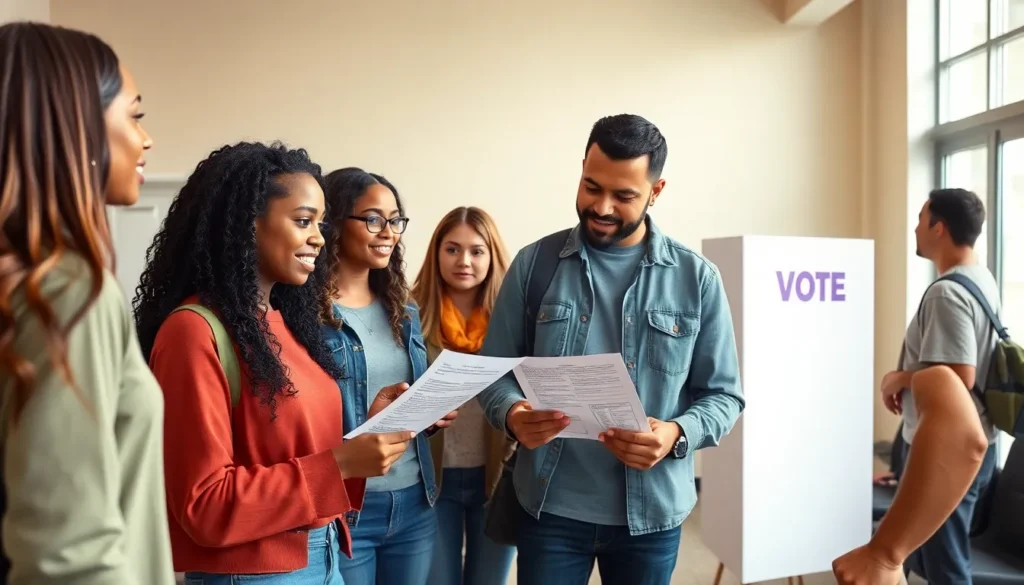Voting is one of the most powerful ways to make your voice heard, but what if you realize you haven’t registered yet? Don’t worry, it’s not too late! The excitement of election season is in the air, and there’s no better time to jump on the registration bandwagon. Whether you’re a first-time voter or a seasoned pro, the question looms large: can you register to vote today?
Table of Contents
ToggleUnderstanding Voter Registration
Voter registration plays a crucial role in the democratic process. Each eligible citizen must register before they can participate in elections.
What Is Voter Registration?
Voter registration refers to the process where individuals sign up to be eligible to vote. This typically involves providing personal information, such as name, address, and date of birth. Each state in the U.S. has its own requirements and deadlines for registration. Many states offer online options, making registration more accessible. Some may even allow same-day registration during elections.
Importance of Registering to Vote
Registering to vote ensures that individuals can voice their opinions through the electoral process. A registered voter participates in local, state, and national elections, influencing decisions that affect their community. Voting helps shape policies and leadership, allowing for representation of diverse viewpoints. Without registration, eligible voters miss the chance to impact democracy directly. Engaged citizens drive change and support issues relevant to their lives.
Eligibility Requirements for Voter Registration

Registering to vote requires meeting specific eligibility criteria set by individual states. Understanding these requirements ensures that potential voters can effectively participate in elections.
Age and Citizenship
To register, individuals must be citizens of the United States. This requirement confirms their right to vote. Moreover, the minimum age for voter registration is typically 18 years old on or before Election Day. Several states allow registration for those who are 17 years old, provided they turn 18 by the next election. Confirming citizenship often involves providing a driver’s license number or Social Security number during registration.
Residency Requirements
Residency requirements vary by state, impacting where voters can register. Most states require individuals to be residents of the state they wish to vote in for a specific duration before registration. This period usually ranges from 15 to 30 days before an election. Living in a state signifies a commitment to that state’s community. Individuals must provide proof of residency, which can include utility bills or rental agreements. Therefore, confirming residency is essential for ensuring voter participation in local, state, and national elections.
How to Register to Vote
Registering to vote is straightforward and can be done through various methods. Individuals should consider their state’s specific guidelines and options for registration.
Online Registration Options
Many states provide online registration, which simplifies the process. Individuals can access their state’s election office website to complete the registration form. Required information typically includes name, address, date of birth, and identification details. Deadline for online registration varies; some states allow registration up to a few weeks before an election, while others may offer same-day registration. It’s essential to check local regulations to ensure compliance.
In-Person Registration Steps
For those who prefer in-person registration, several steps must occur. Interested individuals should locate their local election office or designated registration sites. Bringing valid identification and proof of residency, such as utility bills or government documents, is crucial. Completing a paper registration form on-site typically takes just a few minutes. Most states impose registration deadlines 15 to 30 days before elections, so timely action benefits voters.
Deadlines for Voter Registration
Understanding voter registration deadlines is essential for participation in elections. These deadlines vary significantly by state, influencing when individuals can register.
State-Specific Deadlines
Each state establishes its own voter registration deadlines. For instance, California offers online registration up to 15 days before an election, while Texas requires registration at least 30 days in advance. Some states, like New Hampshire, even allow registration on Election Day, eliminating barriers for late registrants. Knowing specific deadlines ensures individuals can take timely action, promoting active citizenship and engagement in the electoral process.
Special Circumstances for Late Registration
Certain situations allow for exceptions to registration deadlines. Some states provide provisions for same-day registration, enabling eligible voters to register and cast their ballots on the same day. Additionally, exceptions may apply for those relocating or facing unique circumstances, such as military personnel or students studying out of state. Familiarity with these provisions helps individuals navigate the registration landscape effectively, ensuring their voices are heard in elections.
Can I Register to Vote Today?
Many individuals who want to participate in elections often ask about registering to vote right before the deadline. Some states offer options for same-day registration, making it easier for those who haven’t signed up yet.
Checking Your Registration Status
Confirming one’s registration status is an essential step. Individuals can check their status online through state election office websites, which typically ask for basic information like name and date of birth. Each state has distinct processes and access points for this check. It’s wise to verify registration well before Election Day to avoid complications. If individuals find they aren’t registered, this check provides an opportunity to act promptly.
Last-Minute Registration Options
Various states accommodate last-minute registrants with unique options. For example, New Hampshire permits registration on Election Day, while California allows online registration up to 15 days before an election. Individuals can visit local election offices for paper registration if same-day registration isn’t available. Some states also facilitate registrations through extensive early voting setups. Young voters and military personnel often have additional provisions tailored to their circumstances. Knowing these options ensures that everyone can take part in the democratic process, even at the final hour.
Registering to vote is a vital step for anyone looking to make their voice heard in the democratic process. With various options available for registration including same-day registration in some states it’s clear that individuals have the opportunity to participate even at the last minute. By staying informed about state-specific deadlines and requirements, voters can ensure their eligibility and make a difference in their communities. Taking action now can empower individuals to influence the outcomes of local, state, and national elections. Every vote counts and being registered is the first step towards driving meaningful change.





